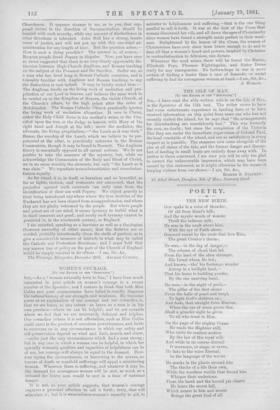WOMEN'S COURAGE.
[To THE EDITOR OF THE "SPECTATOR.") SIB,—As a" woman naturally born to fear," I have been much interested in your article on women's courage in a recent number of the Spectator, and I venture to think that both Miss Cobbe and your commentator have failed to exactly diagnose the natural history of our strength and weakness. My feminine guess at an explanation of our courage and our cowardice is, that we are brave, to any extent--as brave as a man is in his own province—where we can be hclpfal; and we are cowards where we feel that we are necessarily deficient and helplese. Our cowardice (where it is not affectation, such as Miss Cobbe could cure) is the product of conscious powerlessness, and liable to overcome us in any circumstances in which our safety and self-preservation depeud on wind and limb, muscle and sinew, —under just the very circumstances which find a man strong ; but in any case iu which a woman can be helpful, in which her specially womanly qualities and capacities of helpfulness can be 9f use, her courage will always be equal to the demand. How- ever trying the circumstances, or harrowing to the nerves, no terrors of death or manifold sufferings will appal a ministering woman. Wherever there is suffering, and whatever it may be, the demand for courageous women will be met, as much as a demand for brave men would be met in a time of national danger.
It is not, as your article suggests, that women's courage requires a personal affection to call it forth ; truly, that will stimulate it ; but it is womanliness-woman's capacity to aid, to minister to helplessness and suffering,—that is the one thing needful to call it forth. It was at the foot of the Cross that woman discovered her role, and all down the ages of Christianity since women have found a strength made perfect in their weak- ness. Enlightened by the lesson of the Cross, the women of Christendom have ever since been brave enough to do and to dare all that a woman's heart and powers, inspired by Christian in contradistinction to Altruism, can dictate.
Whenever the need arises, there will be found the Manes, Elizabeth Frys, Florence Nightingales, and Sister Boras' ready for any emergencies. No forlorn-hope in war is more certain of finding a leader than a case of domestic or social suffering to find its courageous woman at hand.—I am, Sir, &c.,.
A WOMAN.






































 Previous page
Previous page